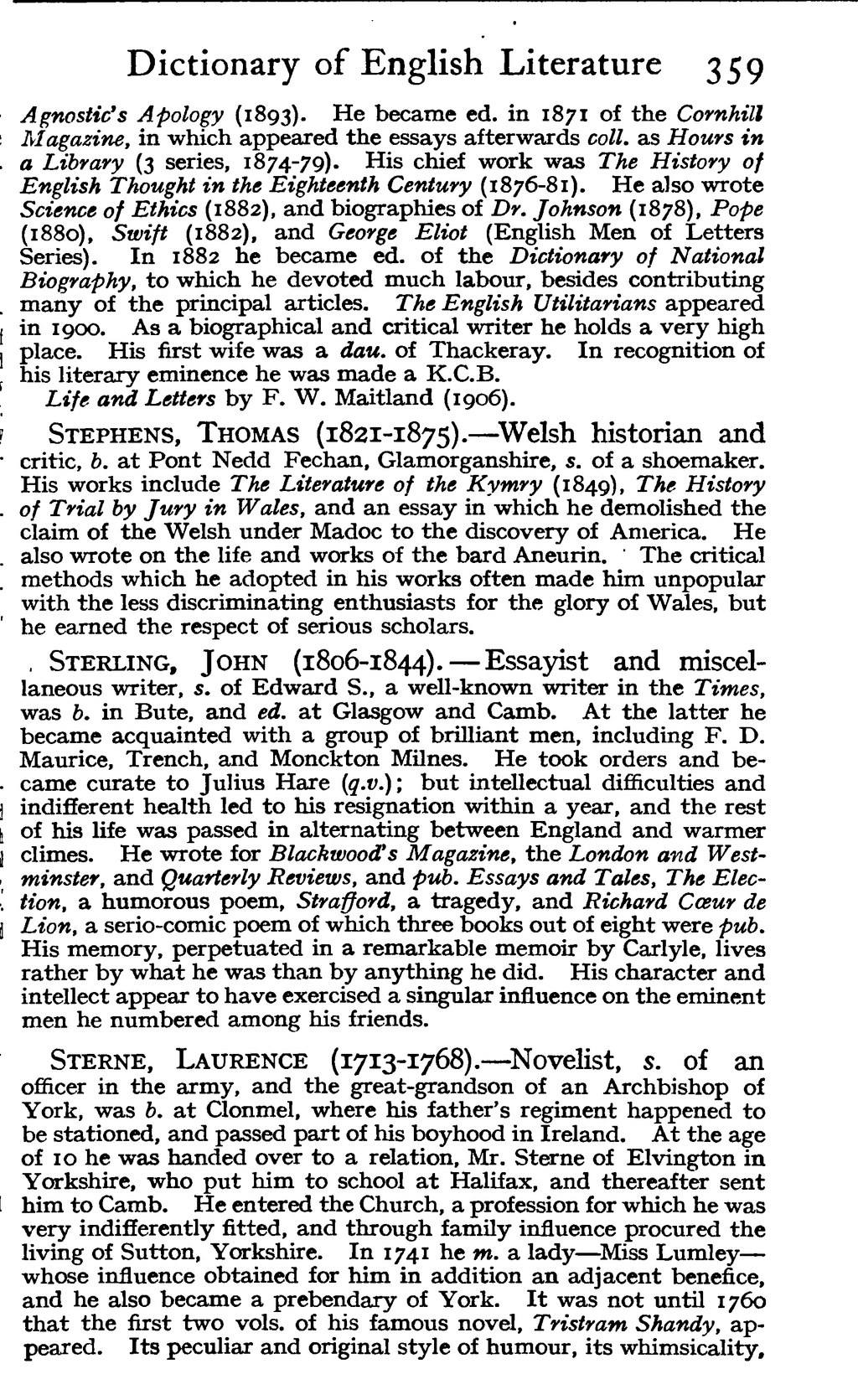Dictionary of English Literature 359
Agnostic's Apology (1893). He became ed. in 1871 of the Cornhill Magazine, in which appeared the essays afterwards coll. as Hours in a Library (3 series, 1874-79). His chief work was The History of English Thought in the Eighteenth Century (1876-81). He also wrote Science of Ethics (1882), and biographies of Dr. Johnson (1878), Pope (1880), Swift (1882), and George Eliot (English Men of Letters Series). In 1882 he became ed. of the Dictionary of National Biography, to which he devoted much labour, besides contributing many of the principal articles. The English Utilitarians appeared in 1900. As a biographical and critical writer he holds a very high place. His first wife was a dau. of Thackeray. In recognition of his literary eminence he was made a K.C.B. Life and Letters by F. W. Maitland (1906).
STEPHENS, THOMAS (1821-1875). Welsh historian and
critic, b. at Pont Nedd Fechan, Glamorganshire, s. of a shoemaker. His works include The Literature of the Kymry (1849), The History of Trial by Jury in Wales, and an essay in which he demolished the claim of the Welsh under Madoc to the discovery of America. He also wrote on the life and works of the bard Aneurin. The critical methods which he adopted in his works often made him unpopular with the less discriminating enthusiasts for the glory of Wales, but he earned the respect of serious scholars.
STERLING, JOHN (1806-1844). Essayist and miscel laneous writer, s. of Edward S., a well-known writer in the Times, was b. in Bute, and ed. at Glasgow and Camb. At the latter he became acquainted with a group of brilliant men, including F. D. Maurice, Trench, and Monckton Milnes. He took orders and be came curate to Julius Hare (q.v.); but intellectual difficulties and indifferent health led to his resignation within a year, and the rest of his life was passed in alternating between England and warmer climes. He wrote for Blackwood's Magazine, the London and West minster, and Quarterly Reviews, and pub. Essays and Tales, The Elec tion, a humorous poem, Strafford, a tragedy, and Richard Cceur de Lion, a serio-comic poem of which three books out of eight were pub. His memory, perpetuated in a remarkable memoir by Carlyle, lives rather by what he was than by anything he did. His character and intellect appear to have exercised a singular influence on the eminent men he numbered among his friends.
STERNE, LAURENCE (1713-1768). Novelist, s. of an
officer in the army, and the great-grandson of an Archbishop of York, was b. at Clonmel, where his father's regiment happened to be stationed, and passed part of his boyhood in Ireland. At the age of 10 he was handed over to a relation, Mr. Sterne of Elvington in Yorkshire, who put him to school at Halifax, and thereafter sent him to Camb. He entered the Church, a profession for which he was very indifferently fitted, and through family influence procured the living of Sutton, Yorkshire. In 1741 he m. a lady Miss Lumley whose influence obtained for him in addition an adjacent benefice, and he also became a prebendary of York. It was not until 1760 that the first two vols. of his famous novel, Tristram Shandy, ap peared. Its peculiar and original style of humour, its whimsicality,
